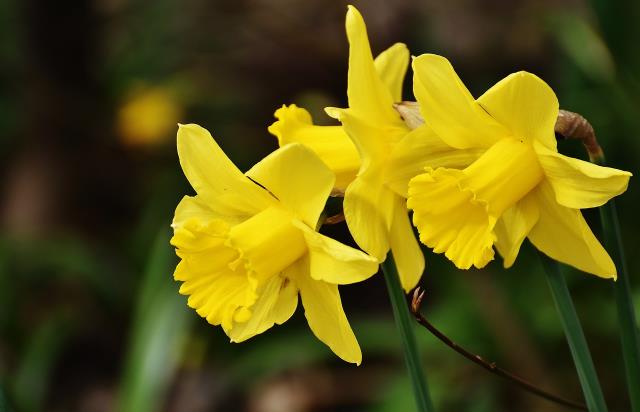By Beatrice Hawkins
Last year I put some daffodil bulbs in the garden after a time in the vegetable crisper and they didn’t come up. Admittedly I was late putting them in, but otherwise I have no idea why they failed to surface. I assumed that they were gone forever! I removed the vincas from the same bed the other day after a slight frost and now there are the daffodils poking through the surface!
The name daffodil comes from the old English words “affo dyle” meaning “that which comes early”, and is appropriate as they are among the first flowers to appear after winter.
One of the joys for gardeners at this time of year is to sit beside a warm fire and drool over bulb catalogues and dream of how things might look in the spring and summer. I do my fair share of this but have about all the bulbs my garden can hold at present.
The humble spud…
When Sir Walter Raleigh brought potatoes back to the kitchen of Queen Elizabeth 1, the cooks didn’t know what to do with them. They threw the tubers out and cooked the stems and leaves. Those that ate them became deathly ill and for many years after potatoes were banned from the Royal kitchen.
These days most people in western countries eat potatoes in some form each day and about 1⁄4 of these are consumed as the ubiquitous ‘french fries”’. French fries were invented by chef George Crum in Saratoga, New York, on August 24th 1853 and first introduced to the White House by Thomas Jefferson during his presidency.
Most of the nutrients in a potato are in the skin and they actually contain more potassium than a banana.
More trivia…
* A banana is actually classified as a herb and a pineapple as a rather large berry. With regard to the banana, I don’t quite know how the classification of herb works, as a herb supposedly is from the leaf of a plant while a spice is from the seed, bark, berry, root or bulb.
* Further, ‘fruit’ is a botanical term while ‘vegetable’ is culinary. Once again this provides some interest, as many botanically classified fruits are regarded as vegetables in the kitchen. For example, tomatoes, pumpkins, capsicum and cucumbers, to name just a few. The definition of fruit that I have always understood is that it must contain the seed within itself.
* Bananas are the second most popular fruit worldwide, eclipsed only by the tomato, with over 10,000 varieties known.
* The bumps on raspberries are called ‘druplets’ and are actually a complete individual fruit.
* Grapes explode if you heat them in the microwave – but why you would want to do this I don’t know!
* There is a garden in England that contains over 100 poisonous plants. Visitors to this murderous garden are prohibited from touching, tasting or smelling any of the plants exhibited.
* While Doris Day may have sung “please, please don’t eat the daisies”, maybe it should have been “don’t eat the buttercups”, as these pretty, harmless looking, plants are quite deadly and can cause a painful death from organ failure if consumed!
* The general guide for watering a lawn is 25-35ml per week. Any more than this may not only be wasted but may actually deplete the soil of nutrients and cause pollution with run-off. Interesting information given the current water situation in our region.
* Dandelions have been used as a food source for at least 1000 years. The seeds were taken to the ‘New World’ by European settlers and cultivated, with the whole plant used. The greens were used as a vegetable or tea, the root as a vegetable or dried and ground as a coffee substitute, while the flowers were used to make dandelion wine or as a yellow dye to colour wool.
* Both Thomas Jefferson and George Washington grew cannabis on their plantations. Can you imagine the uproar if any political figure did that these days? Thomas Jefferson invented a device for making hemp from the plants in 1815.
Don’t forget to mark your calendar for a visit to the Garden Extravaganza in St Mary’s Hall, Wood Street on Wednesday 25 and Thursday 26 July during Jumpers and Jazz in July! For a small charge you will be able to enjoy wonderful morning and afternoon teas, nourishing soups and crusty bread for lunch and gather ideas for your gardens – all inside and out of the weather!
*This is an old article that has been digitised so our readers have access to our full catalogue.







